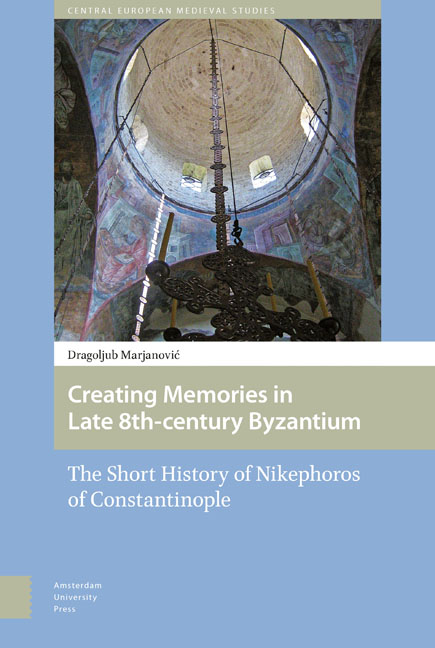Book contents
- Frontmatter
- Contents
- List of Tables
- Preface
- Introduction
- 1 Nikephoros the Layman
- 2 The Short History in the Byzantine Historiographical Tradition
- 3 Herakleios: Model of an Emperor
- 4 The Dark Century
- 5 Iconoclasts Restoring Order
- Conclusion: In Search of an Ideal Image of an Emperor
- Glossary
- Abbreviations
- Bibliography
- Index
2 - The Short History in the Byzantine Historiographical Tradition
Published online by Cambridge University Press: 11 December 2020
- Frontmatter
- Contents
- List of Tables
- Preface
- Introduction
- 1 Nikephoros the Layman
- 2 The Short History in the Byzantine Historiographical Tradition
- 3 Herakleios: Model of an Emperor
- 4 The Dark Century
- 5 Iconoclasts Restoring Order
- Conclusion: In Search of an Ideal Image of an Emperor
- Glossary
- Abbreviations
- Bibliography
- Index
Summary
How can we judge Nikephoros as a historian, in the long line of Byzantine historiographical tradition? What criteria should we use in shaping of such an outlook?
The value of his Short History becomes clear when viewed in the context of the significant data it provides for the history of the Byzantine empire from 610 to 769. Some of the information Nikephoros presented is unique – not attested in any other source. However, such an evaluation of his work is not relevant when judging him as a historian in the context of the time when he wrote, which presents more of our subjective preferences. Thus, a more suitable question is: what kind of literary work did Nikephoros present to his contemporaries? Patriarch Photios from the late ninth century provides us with a not very contemporary glance at the Short History. Nevertheless, it represents the view of an important successor to Nikephoros at the patriarchal see of Constantinople and thus it demonstrates the specific ecclesiastical ideology promoted by Photios, who placed the Short History in the composition of his Bibliotheca right after his description of the History of Theophylact Simocatta. So, did Nikephoros have a plan to create a secular historical work that aimed to continue the last great history of the early Byzantine epoch, and did he seek to legitimize himself as a historian through such an ambition?
It has already been noted that the Short History started with the very same topic with which the History of Simocatta abruptly ended. In our opinion, this is a strong argument that Nikephoros was at least conscious of the lack of historical works, which were rarely written in Byzantium during the seventh and first half of the eighth century, and which did not reach the turn from the eighth to the ninth century. Alternatively, was his aim much simpler but more conceited – to present himself as a continuator of such historiographical and rhetorical skilfulness that even Theophylact brought to the level of bad taste? The Short History does not approve of such a pretension on the side of Nikephoros, but these questions raise the important issue of the place, significance, and possible influence of the Concise Chronicle of Trajan the Patrician, which both Theophanes and Nikephoros obviously utilized, and which appears to have been a historical work of a certain quality and value.
- Type
- Chapter
- Information
- Creating Memories in Late 8th-century ByzantiumThe Short History of Nikephoros of Constantinople, pp. 65 - 98Publisher: Amsterdam University PressPrint publication year: 2017



